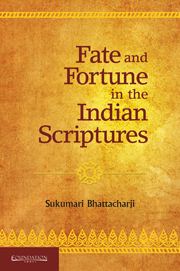Book contents
- Frontmatter
- Contents
- Preface
- Introduction
- Chapter 1 Inception
- Chapter 2 Rebirth and Transmigration
- Chapter 3 Karman and its Consequences
- Chapter 4 Karman, Fate and Free Will
- Chapter 5 Fate, Eschatology and Liberation
- Chapter 6 Premonitions and Presages
- Chapter 7 Deflection: Remedial Measures
- Chapter 8 Vicarious Deflection
- Chapter 9 Fate and Human Endeavour
- Bibliography
- Index
Chapter 8 - Vicarious Deflection
Published online by Cambridge University Press: 05 October 2014
- Frontmatter
- Contents
- Preface
- Introduction
- Chapter 1 Inception
- Chapter 2 Rebirth and Transmigration
- Chapter 3 Karman and its Consequences
- Chapter 4 Karman, Fate and Free Will
- Chapter 5 Fate, Eschatology and Liberation
- Chapter 6 Premonitions and Presages
- Chapter 7 Deflection: Remedial Measures
- Chapter 8 Vicarious Deflection
- Chapter 9 Fate and Human Endeavour
- Bibliography
- Index
Summary
AS the person concerned can himself attempt to deflect the verdicts of fate through vows, charity, meditation, pilgrimage etc. similarly others also can act on his behalf with the same end in view. Sacrifices in Vedic times were sometimes performed by an officiating priest on behalf of his client who wanted a son (putreṣṭi) or overlordship (aśvamedha or rājasūya) or the destruction of his enemies (various abhicāra performances). This trend continued even when sacrifices gradually went out of vogue and in their place came the pūjās. The Little Tradition which had occupied itself with such mundane needs of the society, resorted to sympathetic magic and sought to deflect the adverse moves of fate.
Among such vicarious or indirect deflective measures the ones of first importance were curse and boons. Boons could be awarded (1) by a God to a God, (2) by a God to men and by (3) men to men while curses belong to these three categories as also to a fourth (4) by a man to a God. Boons or blessings can be deserved and undeserved. In the Rāmāyaṇa, Vaiśravana received the boon of overlordship from Brahman. Rāvaṇa, the ten-headed monster received a boon, from the reluctant Brahman only after he had severed his ten heads one by one and offered them to the God; he was blessed with being invincible to birds, serpents, daityas, demons and monsters.
- Type
- Chapter
- Information
- Fate and Fortune in the Indian Scriptures , pp. 225 - 257Publisher: Foundation BooksPrint publication year: 2014

